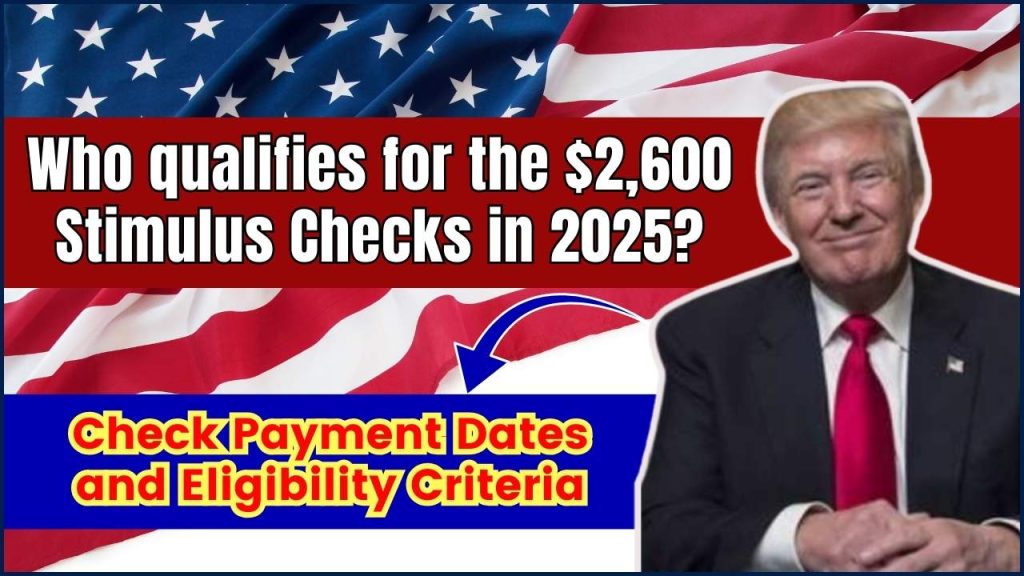
Stimulus Checks in 2025: The U.S. government has announced a potential $2,600 stimulus check for eligible individuals in 2025. This financial relief measure aims to support Americans facing economic hardships due to inflation, rising living costs, and other financial burdens. If you’re wondering whether you qualify for the $2,600 stimulus payment, this guide will walk you through everything you need to know, including eligibility criteria, payment dates, and how to claim your check.
Stimulus Checks in 2025
| Topic | Details |
|---|---|
| Stimulus Amount | $2,600 per eligible individual |
| Eligibility | Income-based; varies by tax filing status and dependents |
| Payment Dates | Expected in multiple phases (TBD by IRS) |
| How to Claim | Direct deposit, paper check, or prepaid debit card |
| Official Source | IRS Website |
The $2,600 stimulus check in 2025 is expected to provide crucial financial support to eligible Americans. If you meet the income and residency criteria, ensure your bank details and tax records are up to date to receive your payment smoothly.
Why Is There a $2,600 Stimulus Check in 2025?
The stimulus check is part of a broader economic relief package designed to provide direct financial aid to American taxpayers. Similar to previous stimulus payments, the goal is to stimulate the economy, help struggling families, and offset the impact of inflation. This initiative is particularly aimed at alleviating the financial strain caused by rising consumer prices and providing relief to low- and middle-income households.
Many factors contribute to the need for another stimulus package, including:
- Inflationary Pressures: The cost of goods and services has been rising at an accelerated pace, making it difficult for families to keep up with everyday expenses.
- Employment Concerns: While unemployment rates have improved, many Americans are still struggling with job stability and underemployment.
- Federal Economic Policies: The government periodically evaluates economic conditions and implements measures to maintain economic stability.
Who Qualifies for the $2,600 Stimulus Check?
To receive the $2,600 stimulus payment, you must meet specific income and residency criteria. Here’s a detailed breakdown:
1. Income Limits
Your eligibility depends on your Adjusted Gross Income (AGI) from your most recent tax return.
- Single Filers: Income must be below $75,000 to receive the full amount. Phase-out begins at $80,000.
- Married Filing Jointly: Income limit is $150,000, with phase-out starting at $160,000.
- Head of Household: Income must be under $112,500, with phase-out at $120,000.
If your AGI exceeds these limits, your payment will be reduced proportionally. Households with incomes above the upper limit will not qualify for the stimulus check.
2. Citizenship and Residency
- You must be a U.S. citizen or legal resident.
- Non-resident aliens do not qualify for the stimulus check.
- Individuals filing using an ITIN (Individual Taxpayer Identification Number) may have additional eligibility requirements.
3. Dependents and Additional Payments
- Parents or guardians can receive extra stimulus payments for dependents under age 17.
- Dependents over 18 (college students, disabled individuals) may also qualify under certain conditions.
- Families with multiple dependents could receive significantly larger payments, depending on eligibility.
How Will the Stimulus Check Be Paid?
The IRS will issue stimulus payments through multiple methods:
- Direct Deposit (fastest method)
- Paper Check (sent via mail)
- Prepaid Debit Card (for individuals without direct deposit setup)
Updating Your Payment Information
To prevent delays, make sure your bank account details and mailing address are updated on the IRS portal. If you’ve recently changed banks or moved to a new address, update your details immediately through the IRS website or by calling the appropriate IRS helpline.
When Will You Receive Your Payment?
The exact payment dates are yet to be announced, but based on previous stimulus rounds, payments are expected to be distributed in multiple phases. Generally:
- Early Filers: Those who have filed 2024 tax returns early may receive payments by Q2 2025.
- Late Filers: May experience delays up to Q3 or Q4 2025.
- Non-Filers: Those who don’t typically file taxes but are eligible (e.g., Social Security recipients) may receive payments at a later date.
Factors That Can Delay Your Payment
- Incorrect Banking Details: If your direct deposit details are incorrect, your payment may be mailed instead.
- Incomplete Tax Return: Ensure your 2024 tax return is complete and accurate.
- Processing Backlogs: IRS processing times may vary based on volume.
How to Check Your Stimulus Payment Status?
You can track your payment status via the IRS Get My Payment Tool:
- Visit: IRS Get My Payment
- Enter your Social Security Number (SSN), Date of Birth, and Address
- Check the status of your payment
What If You Don’t Receive Your Stimulus Check?
If you believe you qualify but haven’t received your payment, follow these steps:
- Check the IRS Portal – Ensure your eligibility and payment status.
- Verify Bank & Address Information – Incorrect details may delay payments.
- Claim It on Your Tax Return – If eligible, you can claim the missing stimulus payment when filing your 2025 tax return.
- Contact the IRS – If your payment is missing or incorrect, call the IRS Help Center.
Common Mistakes to Avoid
- Not Filing Taxes: Even if you don’t owe taxes, file a return to ensure eligibility.
- Ignoring IRS Updates: Stay updated on deadlines and requirements.
- Falling for Scams: The IRS never calls, emails, or texts asking for payment details.
SSI Payments of Up to $967 – 10 Days Left to Secure Your Money! Check Eligibility Criteria
Social Security Payments Rising to $1,976 in February 2025 – Are You Eligible to Get it?
Social Security Payouts to Hit Record Highs in 2025 – Check Your New Benefits!
Frequently Asked Questions About Stimulus Checks in 2025
1. Will the $2,600 stimulus check be taxable?
No, stimulus payments are not considered taxable income. You don’t need to pay taxes on them.
2. Can retirees and Social Security recipients get the payment?
Yes, Social Security recipients (including SSDI, SSI) are eligible as long as they meet income requirements.
3. What if I had a baby in 2025?
If you had a baby in 2025, you may be eligible for an additional stimulus payment. Claim it when you file your 2025 tax return.
4. How can I avoid stimulus check scams?
- Only check updates from IRS.gov.
- Do not share personal or banking details with unsolicited callers.
- Beware of fake emails or text messages claiming to be from the IRS.











